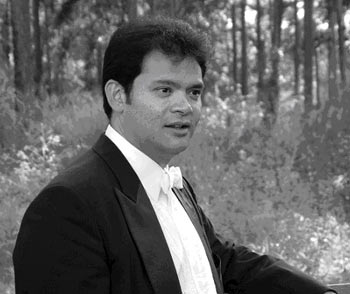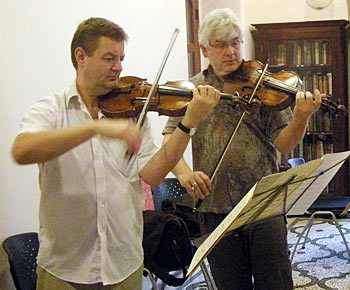Abhishek Mande in Mumbai
It is a sunny December afternoon. The sun is beating on the road as impatient motorcars honk their way out of the traffic jam. We are at the prominent and busy junction of Kemps Corner in south Mumbai and the jam is a normal phenomenon. The car horns blare and an occasional abuse is hurled at an unsuspecting pedestrian.
Behind the closed and immaculately polished door of the Mehli Mehta Music Foundation -- which is located in the same area -- lies a different world altogether. The sounds of the street die out and strains of music float as you wait outside the door contemplating whether or not to ring the doorbell.
The foundation is named after Mehli Mehta, a legendary composer in his own right, but a man who will probably be best identified in today's India as being the father of Zubin Mehta.
Inside, musicians from across the world are preparing for Sangat 2009, the 14th Chamber Music Festival, that will be held in Mumbai over this weekend.
The idea for the foundation came about a decade-and-a-half ago when London-based violinist Harvey De Souza was on his annual vacation to his hometown, Mumbai. Mehroo Jeejeebhoy, also a classical musician, suggested they start something that would promote western classical music in Mumbai.
"Those were (sic) musicless times," De Souza, who is also the Co-artistic Director of the foundation. says. "The western classical music scene had been at its lowest. Mehroo brought in the funds and my brother and I got the musicians."
Sangat, the annual Chamber Music festival, also came about at the same time. "Mehroo had been responsible for getting some very interesting solo acts as well as symphony orchestras to Mumbai. So chamber music was a very evident gap that needed to be filled. That's how Sangat came about," he says.
This month, the festival enters its 14th year and is running a houseful show. Finding an audience for shows, according to De Souza, has hardly been an issue. Contrary to popular perception, he says that the appeal of western classical music has gone much beyond the Parsi community.
"In London, the average audience strength for any chamber music concert is around 300. In Mumbai, it can be as high as 1000 people. More and more people are taking to western classical music," he says, adding that there are over 300 children studying music at the foundation's premises in Mumbai.
'No classical art can compete with popular culture'
Image: Musicians Julian Leaper and Robert Smissen practice before a performanceWith music being phased out of the school curriculum, reaching out to the young children continues to remain one of the major aims of the foundation. De Souza tells us that they use very many innovative practices to inculcate in these kids the love for music. "We get them to play games that sensitise them to various pitches and understand rhythm. The idea is to make them listen actively rather than hear passively," De Souza says.
According to the foundation's website, the Discover Music programme introduces children (as young as four years old) to the basic elements of music, encouraging them to sing as well as listen to music. The Singing Tree choirs also help them develop a sense of musical harmony and the in-house concerts give them a platform to perform.
While he admits that there aren't a lot of young people such as him attending music concerts, De Souza points out that most people are truly drawn to classical music when they grow older. However, the violinist sounds positive of the way western classical music has evolved in India, where cricket and Bollywood music dominate people's collective conscious.
"No classical form of art can ever compete with popular culture. India has a very strong culture and doesn't feel insecure about accepting anything foreign. Everyone keeps talking of the western melting pot but India has been embracing everything that has come its way with grace and poise. That speaks a lot about Indian culture."
De Souza has performed the world over. In an ever-changing and fickle society, he says, his passion for music keeps him sane and truly happy. It is this joy and passion that De Souza hopes to share during his stay in Mumbai. And Sangat 2009 is just a part of this attempt.
Sangat 2009 will involve three concerts on December 18, 19 and 20, 2009 at the Tata Theatre at 6.30 pm.



article